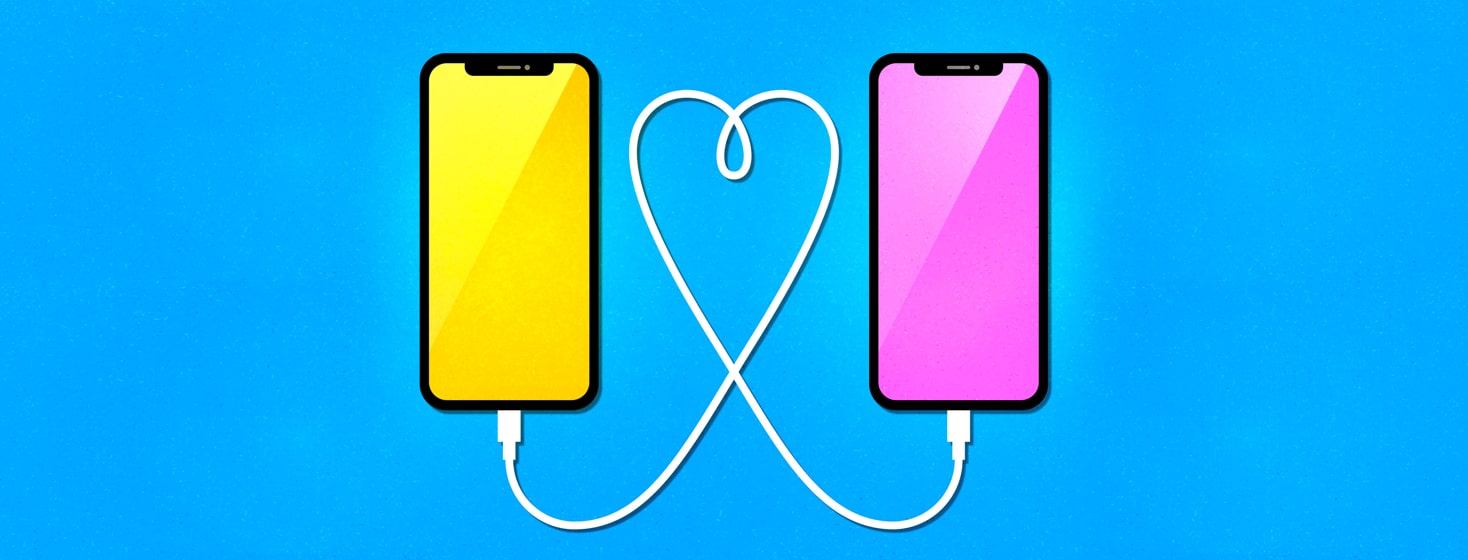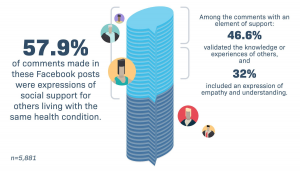
Social Connection in a Time of Physical Distance:
Research Shows Social Media Community Is Key

Amrita Bhowmick, MBA, MPH Chief Community Officer
By Amrita Bhowmick, MBA, MPH
Chief Community Officer – Health Union
August 12, 2020
While technology often seems like the go-to solution for helping people connect while staying physically distant, data linking social media and depression might give us pause. Moreover, with research pointing to social divisiveness online, can social media bring people together and play a meaningful role in the current environment?
Based on results from a recent survey, few Americans think this is possible – in fact, a majority of Americans believe that internet and technology companies are doing more to create divisiveness (60%) than they are to create unity (11%). Perhaps what is most concerning – this is not simply an issue of consumer perception. Facebook’s own internal research found that the platform’s algorithms “exploit the human brain’s attraction to divisiveness.”
These concerns regarding divisiveness are layered upon existing concerns that Americans are increasingly struggling with loneliness – a 2018 survey found that nearly half of Americans (46%) reported feeling lonely. In fact, 22% (which would represent 60 million Americans) reported feeling lonely and socially isolated all of the time. Another study found that the average American reported having only two people they would confide in; 25% reported having no one at all.
As we know, loneliness isn’t just an inconvenience. While social connectedness is linked to a host of mental and physical health benefits, social isolation can result in an overall deterioration in well-being. In addition to negative mental health outcomes, social isolation is associated with progression of cardiovascular disease, delayed cancer recovery, and slower wound healing. In fact, the negative effects of social isolation can be comparable to those associated with smoking 15 cigarettes per day.
While the risk of COVID-19 transmission has resulted in a need to physically isolate, particularly for individuals who are at greatest risk, experts are concerned that the associated social isolation will result in negative consequences, especially for the elderly. Ironically, chronic social stress, which can be a result of isolation, can impair the immune system in as little as one month. This potentially puts those who are quarantining without adequate social support at greater risk of susceptibility to illness. 1,2
Can social media help? Recent research suggests that it can.
Recent research published by Health Union and the University of North Carolina at Chapel Hill demonstrates that online communities can be an effective means for social support for individuals impacted by chronic and severe health conditions. Unsurprisingly, these are the populations that can be most negatively impacted by social isolation – something that has been demonstrated to impact morbidity and mortality.
What’s most interesting is that while there is a consistent stream of activity on our community websites, this research focused on analyzing nearly 6,000 comments specifically from the communities’ linked Facebook pages – the same social media platform that is criticized for increasing divisiveness. The analysis of these comments, spanning six communities, found that social support is the most common type of interaction that occurs (57.9%).
“Your articles seem to come out at the perfect time and speak right to me. It’s as if I unknowingly wrote them myself. Thank you for being the biggest support system I have outside of my family.” – Health Union community member
Commenters who were showing support for others within the community were most likely to validate the knowledge or experience of other commenters (46.6%). Even within discussions where one would expect the focus to be on information sharing, such as treatments and health insurance, social support was a common theme.
These findings are especially meaningful as a previous Health Union survey of more than 2,200 patients found that adults with chronic health conditions are regularly looking to online resources for both information and emotional support. Nearly three-quarters of respondents used condition-specific websites for health information and support, and 65% specifically noted using Facebook.
Furthermore, previous research has shown that the act of seeking information from others with similar experiences can result in greater perceived empathy among all members of the community. This sense of empathy is essential for creating a space where members feel comfortable sharing experiences that are not well understood by people who are not living with the same health condition.
“Unfortunately, what I have learned is that unless you are someone who struggles with it, the rest of the world (including some family and health professionals) just doesn’t care. There will be no support nor empathy. Hence why I am thankful for this site.” – Health Union community member
What can we learn from this?
Like most technology, social media is simply a tool, not a solution in and of itself. And like most situations, the quality of the solution is dependent on how we use the tools that are available. As demonstrated by these research findings, there can be ways to intentionally leverage social media to help combat social isolation, particularly at a time when many of us are struggling to counter the effects of physical distancing.
As consumers, we must be mindful about social media use, ensuring that the primary focus is on creating meaningful connections and building relationships. While news feed algorithms intend to feature content and people that are more likely to be important to end users, it is important to note that these same algorithms may increase exposure to content most associated with negative outcomes, including divisiveness and depression. Although some research has suggested that passively using social media (lurking) may be linked to negative mental health outcomes, other research demonstrates that lurking within an online space that is meaningful, such as topic-specific groups, may still be beneficial.
Perhaps most importantly, it is critical to be aware of how interactions within a social space are monitored – or not monitored. Are community members attacking each other, spreading misinformation, or giving personal medical advice without repercussions? Do community rules exist, and if so – are they enforced in a clear and consistent manner?
While few of us have control over how platforms manage their algorithms and content, organizations that utilize these platforms can hold themselves accountable for managing their own content in a way that encourages respectful interactions. As consumers, we can – and should – expect that any organization that leverages social media to boost its voice is also responsible for maintaining a safe environment. Ideally, these organizations will be rewarded for the quality of their content and interactions as opposed to the sheer quantity of noise they create.
At the most basic level, effective social support can help decrease stress – something that almost everyone can benefit from. Physical distancing may be essential for managing the spread of COVID-19. However, maintaining social connectedness is essential for our health and well-being – both at an individual and a societal level. While it may be easiest to discount technological solutions based on what we know isn’t working, there are opportunities for individuals and organizations to identify pathways to better leverage technology. Doing so in ways that help strengthen our connectedness is more important than ever.
An enormous thank you to my research collaborators and study co-authors: Brian Green, Katie Van Horn, Ketki Gupte, Megan Evans, and Sara Hayes.


